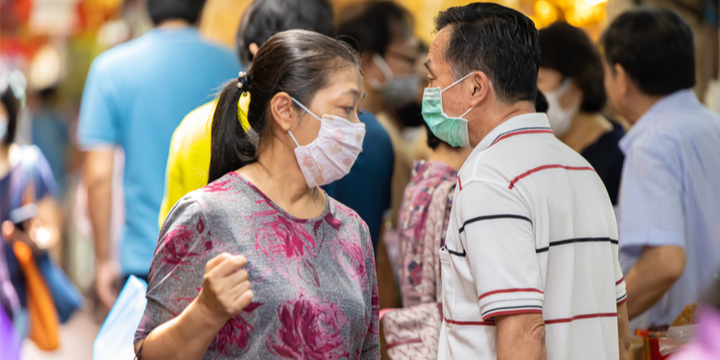China, where the Covid first appeared a year ago, has largely eradicated the epidemic since the spring, thanks to strict movement controls, widespread wearing of masks, containment measures and tracing applications for cellphone.
But China has recorded rising balance sheets in recent days – even if they remain very far from the statements announced abroad. On January 14, the country reported the worst daily toll in terms of contamination since March.
The majority of new cases reported have been in Hebei, the huge province surrounding the capital Beijing (81 contaminations). And it is precisely in this province that a death from the new coronavirus has been announced by the health authorities. They gave no further details.
Read also: Covid: China, Brazil, United States … between renewed cases, mistrust and concerns
First death since May
The last death in China linked to Covid-19 officially dates back to last May. According to the official report, 4,635 people in the country have now succumbed to the disease.
The news quickly generated a reaction on social media and the topic surpassed 100 million views on Weibo, the equivalent of Twitter in China. “It’s shocking, it’s been so long since I saw the words + death of the virus” in China, an Internet user warned, saying he hoped quickly for the end of the epidemic.
New outbreaks of the virus
This new death recorded in China comes after the appearance in recent days of several outbreaks of contamination, prompting a firm response from the authorities.
Heilongjiang, a province bordering on Russia, declared an epidemic “state of emergency” on January 13. Its 37.5 million inhabitants have been instructed to stay in the province except in an emergency and to cancel any planned gathering.
New restrictions
One of the cities in the province, Suihua, which has more than 5 million inhabitants in its vast territory, was placed in quarantine on January 11. Residents must stay at home and public transport has been suspended.
The upsurge in Covid cases worries the authorities as the Chinese New Year approaches, which falls this year on February 12, and gives rise to hundreds of millions of displacements of migrant workers returning to their families.
It is however unlikely that China will experience a “large-scale spread” of the coronavirus, however, assured Feng Zijian, deputy director of the Chinese National Center for Disease Control and Prevention, on Wednesday.
WHO Mission
It is in this context that a WHO team arrived on January 14 in China, in Wuhan (center) where the virus was first reported at the end of 2019.
This WHO team is made up of 10 scientists of different nationalities and will be responsible for going back to the origins of Covid-19. Experts must be submitted upon arrival to a two-week quarantine.
The visit is ultra-sensitive for the Chinese regime, anxious to avoid any responsibility for the epidemic which has killed nearly two million people around the world. Originally scheduled last week, it was canceled at the last minute for lack of all the necessary permissions for the team. And during a rare criticism of China, the head of the WHO regretted that his investigators could not go to the country.
“Reduce risks in the future”
This WHO mission is expected to last between five and six weeks. It will explore “all avenues” but will not seek to identify a culprit, told AFP one of the members, Fabian Leendertz, of the Robert Koch Institute in Germany.
“It is about understanding what has happened to reduce the risks in the future,” said Leendertz. But “one should not expect that […] the team comes back with conclusive results “from this first visit, he warned.
 Cherry tomatoes contaminated with salmonella: 92 sick and 1 dead
Cherry tomatoes contaminated with salmonella: 92 sick and 1 dead  A better coaching method can make a person grow
A better coaching method can make a person grow  What is the method to prevent diabetes in children?
What is the method to prevent diabetes in children?  What are the effective factors in causing stomach ulcers?
What are the effective factors in causing stomach ulcers?  Why do embarrassing memories seem to appear at night?
Why do embarrassing memories seem to appear at night?  The amazing link between SARS-CoV-2 infection and newly started diabetes
The amazing link between SARS-CoV-2 infection and newly started diabetes  WHO says monkey pox is not a global emergency right now
WHO says monkey pox is not a global emergency right now  Single cell RNA sequencing uncovers new mechanisms of heart disease
Single cell RNA sequencing uncovers new mechanisms of heart disease  Hepatitis of unknown origin: 3 new deaths and 228 cases worldwide
Hepatitis of unknown origin: 3 new deaths and 228 cases worldwide 